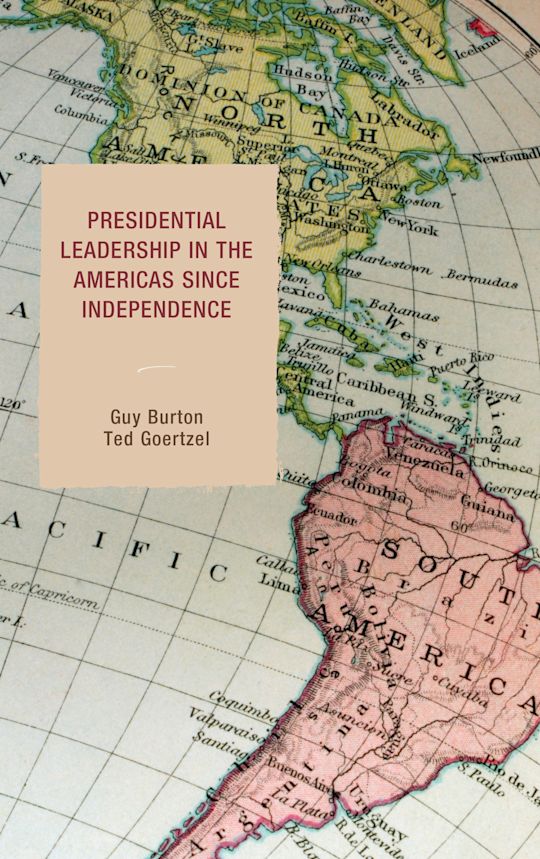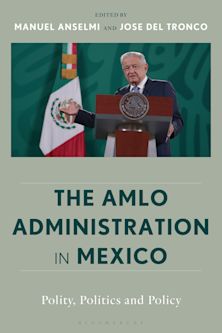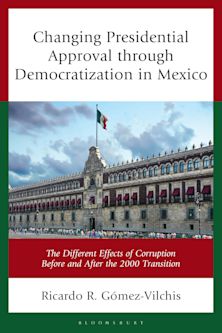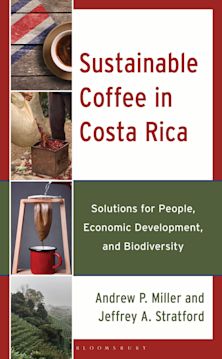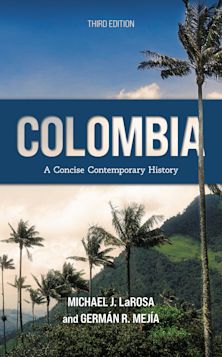- Home
- ACADEMIC
- Politics & International Relations
- Latin American Politics
- Presidential Leadership in the Americas since Independence
Presidential Leadership in the Americas since Independence
Presidential Leadership in the Americas since Independence
This product is usually dispatched within 3 days
- Delivery and returns info
-
Free CA delivery on orders $40 or over
You must sign in to add this item to your wishlist. Please sign in or create an account
Description
What is presidential leadership and why have some presidents been considered “great” – or rather “transformational” – while others are not? What are the drivers which distinguish these presidents from the rest?
Presidential Leadership in the Americas since Independence answers these questions through a systematic study of leadership across the Americas over 200 years, from independence to the present day. Having surveyed who the most cited presidents are in the Americas, Guy Burton and Ted Goertzel examine the experience of presidents from across the western hemisphere: the US, Argentina, Brazil, Chile, Colombia, Mexico, Peru and Venezuela. They study the relationship between these men and women’s actions within the constraints they faced during four political periods: independence, national consolidation during the nineteenth century, state-building from the late nineteenth to mid twentieth centuries and neoliberalism since the 1970s-80s.
The most “transformational” presidents are found to be those who are not only able to innovate and build new political consensuses at a time of crisis, but also consolidate them so that the reforms becoming lasting – and extending beyond an individual president’s own political (even biological) lifetime.
Table of Contents
Acknowledgments
Introduction
Chapter 1: Making Sense of Presidential Leadership
Chapter 2: Identifying the Outstanding Leaders of the Americas
Chapter 3: Historical Eras and Political Regimes in Eight American Republics
Chapter 4: Leadership in the Wars of Independence and their Aftermath
Chapter 5: Presidential Leadership and National Consolidation
Chapter 6: Presidential Leadership in the Era of State Development
Chapter 7: Presidential Leadership in the Era of Neoliberal Globalization
Chapter 8: Conclusion: The Transformational Presidents of the Americas
Appendix A
Appendix B
Bibliography
About the Authors
Product details
| Published | May 23 2019 |
|---|---|
| Format | Paperback |
| Edition | 1st |
| Extent | 292 |
| ISBN | 9781498526586 |
| Imprint | Lexington Books |
| Illustrations | 7 Tables |
| Dimensions | 221 x 154 mm |
| Publisher | Bloomsbury Publishing |
About the contributors
Reviews
-
Burton (Mohammed Bin Rashid School) and Goertzel (Rutgers) approach an old issue in an innovative manner. They examine the question of what factors lead to transformational presidents but do so in a comparative manner with the US and Latin America. The analysis tries to bridge the disciplines of history and political science. The authors desire the detail and context of history along with the generalizability of political science. The theoretical framework, however, is drawn mainly from political science....There is much in this book to be commended, especially the conscious effort to bring in historical and political science approaches.
Choice Reviews
-
This book constitutes the first attempt at a systematic study of presidential leadership in the Americas since Independence. Inspired by the contributions of James MacGregor Burns and Stephen Skowronek on the United States, Burton and Goertzel identify the outstanding leaders of the United States and seven Latin American countries. . . relate their contributions to their countries’ history, and compare the emergent patterns across nations. Their contribution is therefore both methodological and substantive. . . . The book’s contributions. . . pose interesting challenges to both historians and political scientists.
Reviews
-
This fascinating book gives a sweeping account of nearly 200 years of history to determine which presidents in the US and seven Latin American countries were the most ‘transformational’, for good or for ill. The book identifies and ranks outstanding leaders and justifies those choices with detailed historical and institutional analysis. By focusing primarily on historical moments when great change took place, the authors uncover the first-order impact of presidents and highlight the many ways through which that impact can unfold.
Bernardo Mueller, Universidade de Brasília








